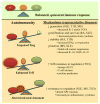CD4+FOXP3+ T regulatory cells in human autoimmunity: more than a numbers game
- PMID: 21856944
- PMCID: PMC3160735
- DOI: 10.4049/jimmunol.1003224
CD4+FOXP3+ T regulatory cells in human autoimmunity: more than a numbers game
Abstract
Regulatory T cells (Treg) play a dominant role in suppression of autoimmune pathology, as rescue of Treg number and/or function in model systems can both prevent and reverse disease. These findings have generated a series of studies addressing the role of defects in Treg number and function in human autoimmunity. However, demonstrating global defects in Treg of individuals diagnosed with autoimmune diseases has been challenging. These challenges are founded, in part, in the complexity of human autoimmune diseases in which various genetic factors and environmental triggers contribute to disease susceptibility. Moreover, contribution of failed Treg-mediated suppression to pathogenesis can extend to multiple mechanisms. In this article, we discuss what is known with respect to the number and function of CD4(+)FOXP3(+) Treg in human autoimmunity, focusing on representative autoimmunediseases in which there are diverse Treg-mediated defects. We also highlight the need to better understand Treg plasticity and function in the context of autoimmunity.
Figures
References
-
- Sakaguchi S, Ono M, Setoguchi R, Yagi H, Hori S, Fehervari Z, Shimizu J, Takahashi T, Nomura T. Foxp3+ CD25+ CD4+ natural regulatory T cells in dominant self-tolerance and autoimmune disease. Immunol Rev. 2006;212:8–27. - PubMed
-
- Bacchetta R, Passerini L, Gambineri E, Dai M, Allan SE, Perroni L, Dagna-Bricarelli F, Sartirana C, Matthes-Martin S, Lawitschka A, Azzari C, Ziegler SF, Levings MK, Roncarolo MG. Defective regulatory and effector T cell functions in patients with FOXP3 mutations. J Clin Invest. 2006;116:1713–1722. - PMC - PubMed
-
- Ochs HD, Gambineri E, Torgerson TR. IPEX, FOXP3 and regulatory T-cells: a model for autoimmunity. Immunol Res. 2007;38:112–121. - PubMed
-
- Baecher-Allan C, Brown JA, Freeman GJ, Hafler DA. CD4+CD25high regulatory cells in human peripheral blood. J Immunol. 2001;167:1245–1253. - PubMed
Publication types
MeSH terms
Substances
Grants and funding
LinkOut - more resources
Full Text Sources
Medical
Research Materials


